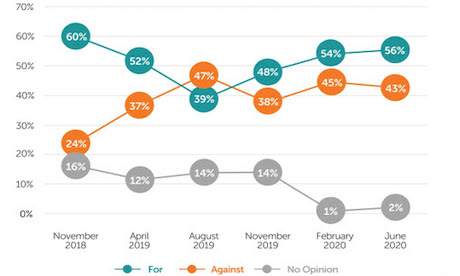The Nathaniel Centre has posted a report by Dr Lynne Bowyer and Dr Deborah Stevens co-directors of The New Zealand Centre for Science and Citizenship Trust.
They conclude there is no evidence to suggest that legalising cannabis will provide a solution to the drug-related issues that disproportionately affect marginalised/minority groups.
“These issues include negative impacts on health, education, employment and criminal convictions.
Although in some jurisdictions where recreational cannabis has been made legal, there is a reduction in the overall conviction numbers, legalisation does nothing to reduce the disproportionate conviction rate of marginalised/minority people.”
Decriminalisation
Bowyer and Stevens suggest a better way forward may be to take the time to explore and publicly discuss the decriminalisation of cannabis.
Decriminalisation involves removing the criminal penalties for possession and use, without actually making possession and use legal.
They suggest decriminalisation would facilitate the separation of cannabis use from issues of social justice and provide space in which the broader negative issues that plague marginalised people can be adequately addressed.
Two Polls – different results
A poll commissioned by New Zealand’s largest medicinal cannabis company, Helius Therapeutics. shows that 56% of New Zealanders would vote in favour of legalising the personal use of cannabis in the upcoming referendum.
43% indicated they would vote against the proposed changes.
Horizon Research conducted the survey between June 10 and 14, 2020.
However, a One News Colmar Brunton poll found that 49 per cent of New Zealanders opposed legalising cannabis.
Those in favour of legalising it had gone up a percentage point to 40 per cent.
The poll, of 1007 eligible votes, was done to mobile phones and landlines between June 20 and 24.
In both polls, when compared to the previous polls, the number favouring change had increased and the number opposing change had declined
Longitudinal studies
The findings of the Christchurch Health and Development Study and the Dunedin Multidisciplinary Health and Development Study show that:
- Cannabis use is very common, with as many as 80% of participants having used cannabis on at least one occasion.
- Rates of regular use (using at least weekly) were far lower (35%).
- Higher levels of cannabis use, particularly at younger ages, were related to mental health problems including increased risk of cannabis use disorder and major depression.
- Earlier and heavier cannabis use was also related to increased reports of psychotic symptoms in the Christchurch study, and increased risk of meeting criteria for a diagnosis of psychotic illness in the Dunedin study.
- Further research by both studies has found that long-term cannabis use is also associated with gum disease, impaired lung functioning, and cognitive problems.
- Earlier and heavier users of cannabis were less likely to complete educational qualifications, and were more likely to report being unemployed, or receiving a benefit.
- While only a minority of cannabis users went on to use other, possibly more dangerous illicit drugs, those participants who were heavy cannabis users in adolescence were especially at risk.
Source
